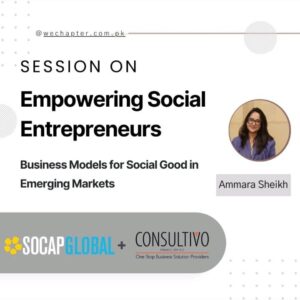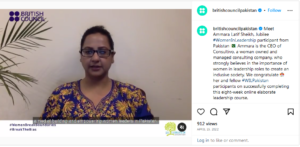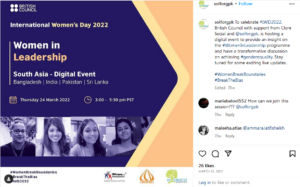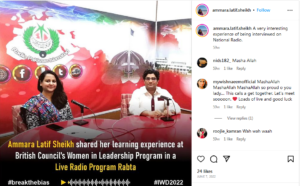Grow Learn Connect - Interview
Interview with Ammara Sheikh
Grow Learn Connect: Ammara, let us start with the roots. Our family, school, friends, childhood experiences shape who we become as adults. What was your experience as a child or adolescent and how did it influence the current Ammara?
Ammara Sheikh: I come from a well-educated family and had a comfortable childhood. My father did his master’s in engineering at the University of Virginia, USA, and then he worked as a civil servant at a government organization, while my mother was an educationist.
I have a sister, and both of us were brought up without any gender discrimination. Our parents supported us with everything that we desired to accomplish. I owe a great deal to my parents for always being there by our side and encouraging us to do more and aim for a higher goal.
I made some amazing friends in school and college who are with me to this day, and when I decided to start my own venture, they extended help to me in every way they could.
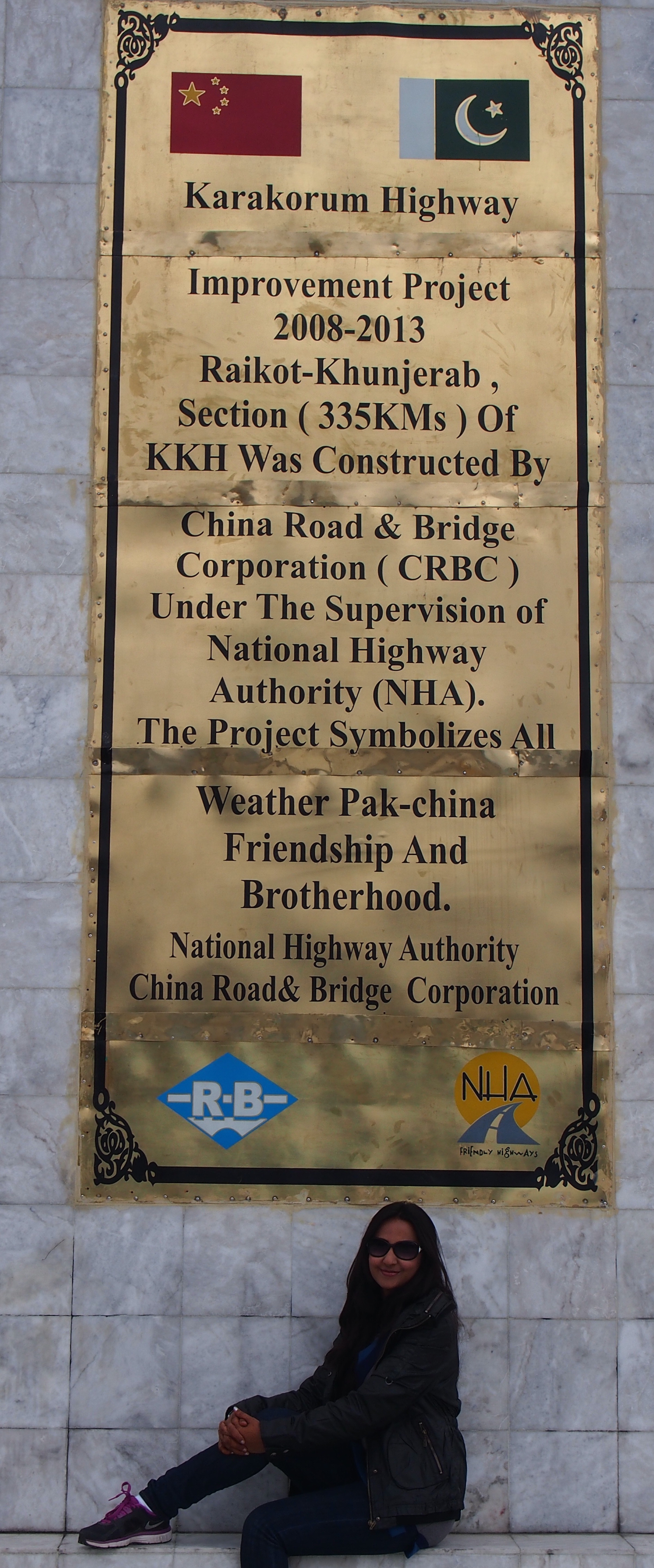 GLC: Tell us about your first steps into the finance and taxation world. How did you become interested in those topics?
GLC: Tell us about your first steps into the finance and taxation world. How did you become interested in those topics?
AS: I took my first job as a trainee business analyst at Akzo Nobel Pakistan Ltd. Then I took a break to care for my mother who became terminally ill at that time. When I wanted to return to work, no company would even call me for an interview because of a job gap on my resume.
I did not give up and kept applying until I had a job offer from the Chinese infrastructure company. I seized that opportunity and joined as an assistant finance manager for the Karakoram Highway Project. Since I was the only Pakistani (and the only woman) in their finance department, I helped with local compliances and tax matters. Although I had no previous relevant work experience (but I had the required education), I worked hard to learn about the specifics of managing foreign companies in Pakistan. I attended workshops on taxation that were conducted by ACCA Pakistan. That further sparked my interest in the topic.
GLC: You mentioned that you were the only woman in the finance department. What did it feel like?
AS: In our local setting, working with foreign nationals provides more equitable work opportunities for women. I had to prove my performance on both ends — as a Pakistani and a woman. Thankfully, my foreign colleagues were incredibly supportive.
GLC: How did you become passionate about the economic empowerment of women in Pakistan?
AS: I source my inspiration in my own life experience.
I have mentioned that I had once quit the job to take care of my ailing mother and then again during the pandemic to care for my daughter. During my first work break, I was young and did not have enough work experience, but when I had to quit again, I was determined to make a positive CHANGE! Caring for the family does not mean one should let go of their earnings and financial independence. No woman should have to choose between family and her career. Therefore, during the pandemic, I decided to establish an online work platform for women who found themselves in a comparable situation. We offer shared services solutions to foreign companies and women-owned business(s) while engaging women to work with us remotely with flexible hours.
GLC: What inspired you to leave the corporate world and start your own consulting firm?
AS: I always had my mindset on having my own business. With this intention, I launched my company in 2019. I must admit, I was hesitant to leave the job with so many WHAT IFS in my head. Finally, the pandemic gave me the push I needed to make that final transition. I was lucky to find my first corporate client from the development sector within three months of quitting the corporate job, and since then there has been no looking back.
GLC: You established your business during the pandemic. What obstacles did you have to overcome and how did it benefit your company?
AS: Interestingly, none!
I am thankful that the pandemic brought about the global acceptance of remote work options. If nothing else, it has been extremely empowering for women in terms of financial inclusion and independence.
I never had a chance to travel outside of Pakistan to get a degree or certifications because of other commitments at home. During the pandemic, I completed a brilliant certification program on social entrepreneurship at the Miller Centre, University of Santa Clara, USA, and worked with mentors from Silicon Valley.
Currently, I am also attending a leadership program at Clore Social Leadership, UK, which is being facilitated by the British Council in Pakistan.
So, the pandemic has opened numerous doors for ambitious women like me who want to do it all.
GLC: What is the company’s mission? How large is your company? What services does it offer? What stands your company apart from other consulting companies in the area? What are you hoping to accomplish in the next 5-10-15 years?
AS: Consultivo is a boutique consulting and outsourcing company, a concept unheard of in Pakistan. Our team comprises three full-time employees (all women), one part-time employee, one volunteer, and two legal consultants. We are a fully remote team and make use of digital tools to coordinate and manage work. Currently, we are also hosting two interns from Botho University, Lesotho.
At present, we are offering accounting, tax management, business advisory, regulatory compliance management, and other services. We plan to scale up this year and start providing human resources and marketing services as well.
My goal is to establish a woman-owned consulting brand in Pakistan and venture into other domains of the service industry.
GLC: Tell us more about the We Chapter project. What are you trying to achieve?
AS: WE CHAPTER was conceived in 2021 when I participated in the Miller Centre accelerator program for social entrepreneurs. There is no concept of social enterprises in Pakistan and registering an NGO is almost impossible for a common person, so, we opted to start the WE CHAPTER initiative under the CONSULTIVO brand.
WE CHAPTER is a social enterprise wing of CONSULTIVO that is entirely dedicated to facilitating women-owned businesses through the same quality of services that we offer to our corporate clients but at nominal rates.
Our competent team is dedicated to educating and facilitating women-entrepreneurs on issues, such as corporate governance, taxation, financial management, and digitalization to establish more compliant and sustainable women-led businesses and improve their access to formal sources of finance.
GLC: How did you become a trainer? What influenced your decision to step into the learning and development realm?
AS: I never aimed to become a trainer, but when I started the WE CHAPTER project, I realized how many women entrepreneurs did not know how to manage businesses. For example, they would be manufacturing great products but would be clueless about how to manage the operational end of the business. My own clients and mentors pushed me into training because they felt I explained things very clearly.
My first training was for a batch of local women artisans from Lyari (a slum). It was a basic awareness session for them to realize the need for managing finances. Then I did another online training for a local cohort of women entrepreneurs (from the CATERPILLHERS/Miller center accelerator) on doing business in Pakistan and third-party reporting.
From there, things just picked up. For example, I collaborated with another woman-owned organization STIMULUS for a capacity-building project funded by Friedrich Naumann Foundation (a German donor agency). This was my first in-person day-long workshop on financial management and I received very encouraging feedback from the participants. These were my first steps into the L&D world.
GLC: How did your previous experience in the private sector shape you as a trainer and consultant?
AS: I would say it shaped me a great deal. This is where I learned the best practices of running a business and creating an ethical work culture. I watched and learned from my seniors, peers, and other stakeholders who had a significant impact on the future strategy for my own business.
GLC: Who is your target audience? What kind of training do you deliver these days?
AS: My usual target audience is women, because there is so much room for raising awareness around taxation not only with women entrepreneurs but also working women. In Pakistan, most of the accounting and audit firms are run by men, and women feel either reluctant or overwhelmed while discussing their finances with men-counterparts. Our premise is to communicate things in a most simplified manner and avoid technical jargon to help women better understand the topic.
GLC: What makes you a good trainer?
AS: My ability to engage with the audience in a friendly way.
GLC: What are the next steps in your development as a trainer?
AS: I aim to become an IFC-LPI certified trainer and start offering more training workshops in Pakistan.
GLC: As a result of the pandemic, the entire world moved into the virtual realm. How important is it for a trainer to be able to facilitate learning online and keep up with innovative technology?
AS: We all know that it is much more difficult to engage the audience online than in person, and this is where the digital interactive tools come in very handy. The more participatory and interactive the training session is, the better feedback one gets from the audience.
GLC: During the webinar, you will talk about the different tools for instructional designers, including MENTIMETER, CANVA, and AHASLIDES. How did you become proficient with this software?
AS: I completed an accelerator program with the mentors from Miller Centre USA, where I learned about various digital tools for designing social media content, business models, and business pitches. As a founder of a start-up, I had to master a lot of skill sets to be able to do everything on my own. This helped keep the start-up lean and control costs.
From there on, I explored many tools by myself, and I am mostly self-taught. Sometimes we only need some guidance to get us started and the rest will depend on your own vision, consistency, and hard work.
I learned about these interactive tools from the international online workshop that I attended. Their sessions were fun and engaging, which prompted me to explore these tools on my own and start using them in my own training deliveries.
SIGN UP TO ATTEND AMMARA’S WEBINAR
GLC: What is your favorite TED talk and why?
AS: This talk by Shaolin Master Shi Heng Yi (‘5 hindrances to self-mastery‘) helped me realize that it is not destiny that matters but the experience of the journey itself.
GLC: Describe yourself in five words.
AS:
- Ambitious
- Empathetic
- Encouraging
- Respectful
- Positive
 GLC: If you had more free time during the day, you would…
GLC: If you had more free time during the day, you would…
AS: …spend it with the family. We like taking road trips across Pakistan to explore novel places and experience the variety of diverse cultures we have here.
GLC: What is one key message you would like your daughter to take away from your life experience so far?
AS: Make the best of your current circumstances and always respect your seniors (mentors, teachers, managers).

